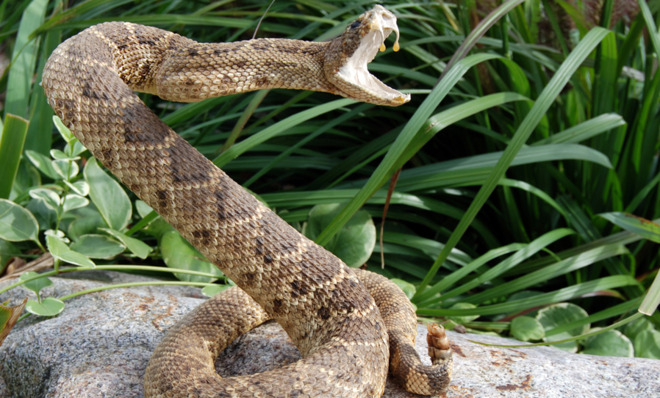The evolutionary science behind our fear of snakes
Primates and humans may be hard-wired to avoid the reptiles at all cost

A free daily email with the biggest news stories of the day – and the best features from TheWeek.com
You are now subscribed
Your newsletter sign-up was successful
Lots of people are terrified of snakes, despite the fact that most of us simply don't run into too many of the hissy predators anymore. Now everyone from Indiana Jones to Samuel L. Jackson to my mom may have just had their ophidiophobia vindicated by evolutionary science.
In a new study published in the Proceedings of the National Academy of Sciences, a team of biologists discovered that a fear of snakes may have evolved as a highly efficient survival mechanism in primates, possibly to help them (and us) avoid pesky and potentially life-ending bouts with the remarkably complex poison found in snake venom.
It turns out that we primates are really good at avoiding snakes. Many other mammals aren't. To test why this is, the Los Angeles Times reports that researchers hooked probes up to the brains of two Japanese macaques. They discovered that the "neurons in a part of their brain that controls visual attention were more strongly and quickly activated in response to images of snakes, versus other objects."
The Week
Escape your echo chamber. Get the facts behind the news, plus analysis from multiple perspectives.

Sign up for The Week's Free Newsletters
From our morning news briefing to a weekly Good News Newsletter, get the best of The Week delivered directly to your inbox.
From our morning news briefing to a weekly Good News Newsletter, get the best of The Week delivered directly to your inbox.
The two monkeys had never seen snakes before in their lives.
Human and primate brains, in other words, may be pre-programmed to spot snakes before they attack. A little corner of the brain's visual system seems to be specifically reserved for their avoidance.
Though fear of snakes may not be innate, noticing them more than other phenomena may be hard-wired by evolution, said Lynne Isbell, an evolutionary biologist from UC Davis and one of the authors of the paper. That heightened attention, research has shown, can lead to early and resilient learned behavior, such as fear-mediated avoidance. In other words, getting out of the way of snakes. [Los Angeles Times]
Millions of years spent dodging snakes might partly explain why humans have remarkable vision, at least by mammalian standards. We can perceive depth. We see things in color. We have "very good visual acuity," as Isbell notes.
After a run-in with a cobra in Kenya several years ago, Isbell froze up, despite having never seen one before. Her research inevitably led her to discover that primates living in parts of the world with poisonous snakes somehow evolved superior vision compared to their peers. It's "no accident" that lemurs in Madagascar have extremely poor vision, Isbell tells NPR. There aren't any venomous snakes there.
A free daily email with the biggest news stories of the day – and the best features from TheWeek.com
So, if you should be unfortunate enough to encounter snakes on an airplane and feel strangely compelled to yell loud profanities, evolutionary biology suggests it would be well within your rights to do so.